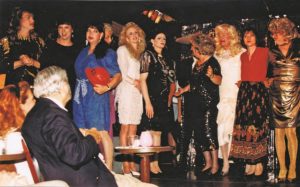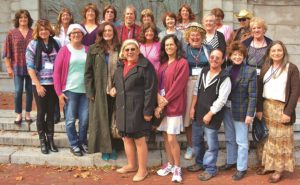In November 1980, a journalist named D. Keith Mano wrote an article for Playboy titled “It’s No Fun Being a Girl.” The article — which I read thanks to a one-month subscription that I mustn’t forget to cancel — is about attending Provincetown’s Fantasia Fair, then mostly a convention for cross-dressers and “transvestites.”
Mano went undercover as “Deirdre” — silicone boobs, Naired legs, wig. It’s very entertaining, if dated — he described P’town as “the foreskin on old Cape Cod, that bent and flaccid peninsula.” Early on, Mano wrote, “My toes are crushed, choked by the down-slant squeeze of my three-inch-high strap footwear. Size ten and a half, also EEE — which is both my width and a sound I want to make.” At one point, Mano, who was perhaps best known as a columnist for William F. Buckley’s National Review, described making out with a fellow Fantasia Fair attendee and wanting to vomit.
Even so, when “It’s No Fun Being a Girl” first came out, Dallas Denny read it, enraptured. Deterred by a line about Fantasia Fair’s price tag — “Per room, per week, it costs an arm, a leg, and the stuffing in your hubba-hubba heinie,” Mano wrote — she held off attending until 1992. But it was a sign that there were other people out there who might understand her. Denny would later become the fair’s director for six years.

Writing about Fan Fair 41 years later, I have one big advantage over Mano. I didn’t have to go as anyone but myself. As a nonbinary person, I’m a member of this community, not an outsider. I showed up to registration in my street clothes (jeans, binder, button-up) and was handed my badge: “Saskia Keller. They/Them.”
Fan Fair (which ran from Oct. 17 through 24 this year) has changed a lot since 1980. It’s now firmly a transgender event, though some attendees still identify as cross-dressers. This is reflected in Fan Fair’s rebranding — it’s no longer about “fantasy” or spectacle but rather identity and reality.
Many attendees use pseudonyms or conceal their last names. Perhaps they aren’t out in their hometowns because it isn’t safe, or they aren’t ready. Photography is regulated — badges with a crossed-out camera denotes those who wouldn’t want to be surprised with candids. There are workshops for couples as well as ones focusing on mental health, medical procedures, and transgender history.
While most attendees are older white trans women, director Dee LaValle said that Fan Fair is trying to attract more trans men, nonbinary people, 20-somethings, and people of color. But, as in 1980, Fan Fair’s cost remains prohibitive to some. The early bird registration rate is $550 for the week. Though Fan Fair offers scholarships, they could be better publicized.
One workshop that I attended was “Trans-Generational Coalition Building,” led by Ivy Monroe. As we took inventory of ages, a clear divide emerged. A half-dozen people were under 35. Most of the rest were over 55. One younger attendee remarked that the cost of registration was more than they made in a month. Would that money do more good if given to a transgender charity? Spirited discussion ensued.

While Fan Fair wasn’t always comfortable — I experienced some imposter syndrome about not being “trans enough” — it was enlightening to speak to “elders” in the community and people with different experiences than mine.
One highlight was “Common Threads” on Wednesday night. The event used to be a fashion show, but that catered too much to certain subsets of the transgender community. Not everyone can afford a ball gown, let alone wants to wear one. The event is now about strutting your stuff in whatever clothes feel most comfortable.
Friday night culminated in the “Follies,” a talent show. There was a rather avant-garde performance titled “Yeah Yeah” involving loud music and drumming by Mary Beth Cooper. Alyssa Grant’s rendition of “No Matter What” was strikingly beautiful. It was moving to see people being so authentically themselves onstage.
The week made me realize just how lucky I am to be able to live here. “In Provincetown, you can turn the noise off,” said LaValle. “You can listen to your heartbeat and what it’s telling you. The town is like training wheels for your life. When I first came here, I remember thinking, ‘Now I know what it felt like when the Pilgrims first saw land.’ ”



